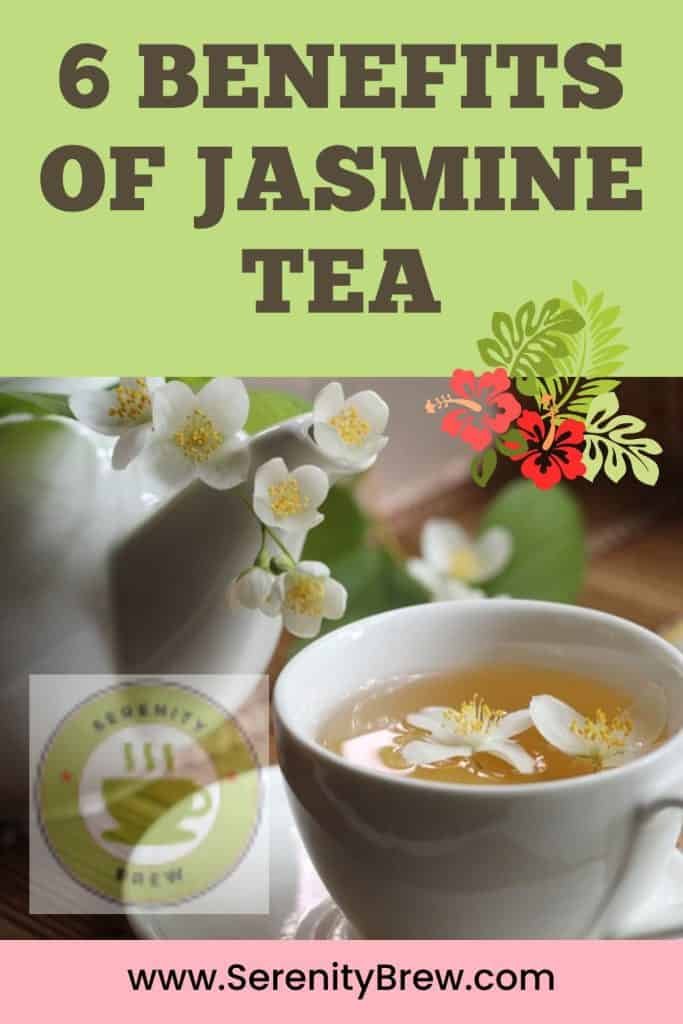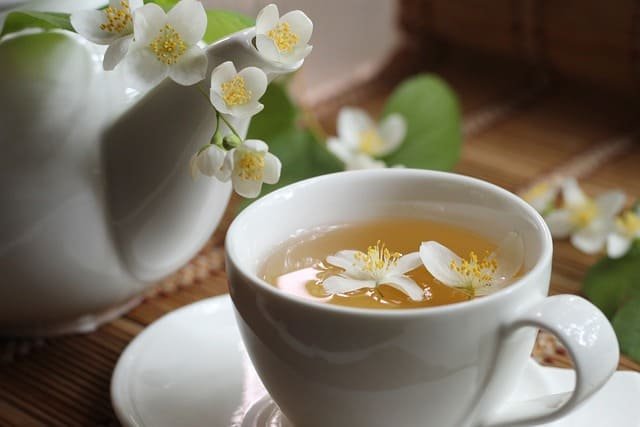
The aroma of jasmine is recognized and enjoyed in all parts of the world. Its white flowers are considered mystical, perhaps because they are identified with Arab countries (although they come from the Far East) and in the language of flowers they symbolize purity and grace.
Precisely the name comes from the Persian “Yasmin” which means “fragrance” and the poets have dedicated their best verses to it. It is that there are jasmines for all tastes, the most common and the most exquisite, climbers and shrubs, those that lose their leaves in winter and those that do not. But all true jasmines are white.
How could it be otherwise, it was the Chinese who used some of the 200 species of jasmine to decorate or flavor their delicate cups of tea.
Jasmine Tea: Properties
Jasmine tea is made by adding jasmine flowers and leaves to green or white tea. This combination became very popular in the Chinese Ming dynasty and the illustrations on their porcelains show scenes of daily life that include teacups with their white flowers.
Its taste is subtly sweet and it is the most drunk aromatic tea in China. It is considered good manners to serve jasmine tea as a welcome gesture to guests.
To prepare this tea, in addition to the basic green or white tea (although oolong or black tea can also be used), 2 varieties of jasmine are used:
– The Jasminum officinalis or common jasmine, which is the vine (top photo) that can reach up to 6 meters in height
– Jasminum sambac or Arabian jasmine, especially a variety called “Grand Duke of Tuscany”, which is the shrub commonly used to decorate gardens.
Good-quality jasmine tea is scented with fresh jasmine flowers, while affordable options are flavored with jasmine oils or jasmine extract. The end result produces a clean and fragrant smell, with a sweet taste.
The proportions between the leaves and the jasmine flowers used are also often varied, or the use of more or less young leaves. Both flowers and leaves are left to dry in a warm room and can then be rolled, cut into strands, mixed with the base tea (usually green), presented in tea bags or “pearls”. These are usually made with two parts of flowers and one part of jasmine leaves and are very attractive to present next to the cup of tea.
Along with the unique aroma and taste, jasmine tea has many beneficial qualities that help reduce stress and heart attack and improve the digestive system. Let’s take a look at them in detail.
Jasmine tea benefits

As jasmine tea is a mixture of a base tea (green, white, oolong, etc.) and the infusion of jasmine flowers and leaves, the properties of this drink are a combination of these two preparations.
The benefits of green tea or “tea of eternal youth” have been well known since ancient times and those of black tea as an alternative energy source to coffee are gaining ground every day, but what benefits does the aromatic jasmine plant provide?
1- Helps to lose weight:
Everyone is looking to fight obesity and improve their health by losing weight and jasmine tea can be a good addition to any diet as a weight loss aid. A 2012 study, revealed that the antioxidant properties of jasmine tea help increase active metabolism. This increase in metabolic efficiency makes exercise more effective and helps the body process nutrients faster.
2- Antioxidant properties:
Perhaps the most praised aspect of jasmine tea is the high level of antioxidants in this delicate and delicious drink. The most notable antioxidants found in jasmine tea are catechins , the same type found in green tea. Antioxidants work in our body, inside and outside cells to detect and destroy harmful agents (“free radicals”) that are produced by natural aging, or by external agents such as toxins, viruses, ultraviolet rays, tobacco, etc. and that cause disease and compromise the immune system.
3- Stimulates the immune system:
Jasmine tea helps protect the immune system, as it has anti-inflammatory and antioxidant properties. A study revealed that jasmine green tea is a rich source of natural polyphenol antioxidants that mainly include epicatechin (EC) and epicatechin gallate (ECG). The immune system is the first line of defense against all kinds of diseases, so strengthening it is a direct benefit to prevent the most common infections and many forms of cancer. In addition, chronic diseases such as diabetes or arthritis have an immunosuppressive effect, so strengthening this system is even more important, so drinking jasmine tea regularly helps strengthen the immune system and reduces the risk of complications from these diseases. Chronicles.
4- Protects the health of the heart:
For those with a personal or family history of cardiovascular problems, jasmine tea can be a great help in preventing further problems. A study in the reports that the catechins found in jasmine tea are a key factor in preventing the rise of LDL cholesterol (or “bad cholesterol”), which is what causes the walls of the arteries to become inflamed and hard. . This inflammation of the veins and arteries can lead to a heart attack or stroke. The catechins found in jasmine tea inhibit this process, so cholesterol levels and blood pressure are lowered, and long-term threats like heart disease can be prevented.
5- Relieves stress:
One of the simplest and most powerful health benefits of jasmine tea stems from its delicious aroma. Mood is largely dependent on what we perceive through our five senses, and jasmine tea works directly on two of those senses to elevate mood and increase relaxation.
Studies have shown that the olfactory senses have a powerful connection to relaxation. The scented aroma of jasmine tea can trigger a parasympathetic response, which releases chemicals that help the body relax and unwind. Some studies go a step further by examining the sedative effects of jasmine tea aromas, although the results have been inconclusive and continue.
Naturally, taste is the second sense directed by jasmine tea. The sweet flavors of jasmine induce a relaxed state, while the cool finish adds an invigorating scent that can perk you up after a long day. By drinking jasmine tea for stress relief, you are also forced to take a few minutes out of the day to refocus and relax.
6- Benefits for the skin:
Jasmine flowers and teas and essential oils derived from flowers and leaves have antibacterial and antioxidant properties that make skin look its best. While jasmine oils can be used topically on the skin for wounds and scars, drinking jasmine tea can also offer some great skin benefits.
The powerful antioxidants and polyphenols in jasmine tea help slow down the aging process by eliminating free radicals that cause wrinkles and skin damage. These polyphenols also work to even out skin pigmentation and minimize fine lines. To get the benefits of jasmine tea for the skin, you can consume 2 cups per day or wash your face with a cup of cold jasmine tea.
